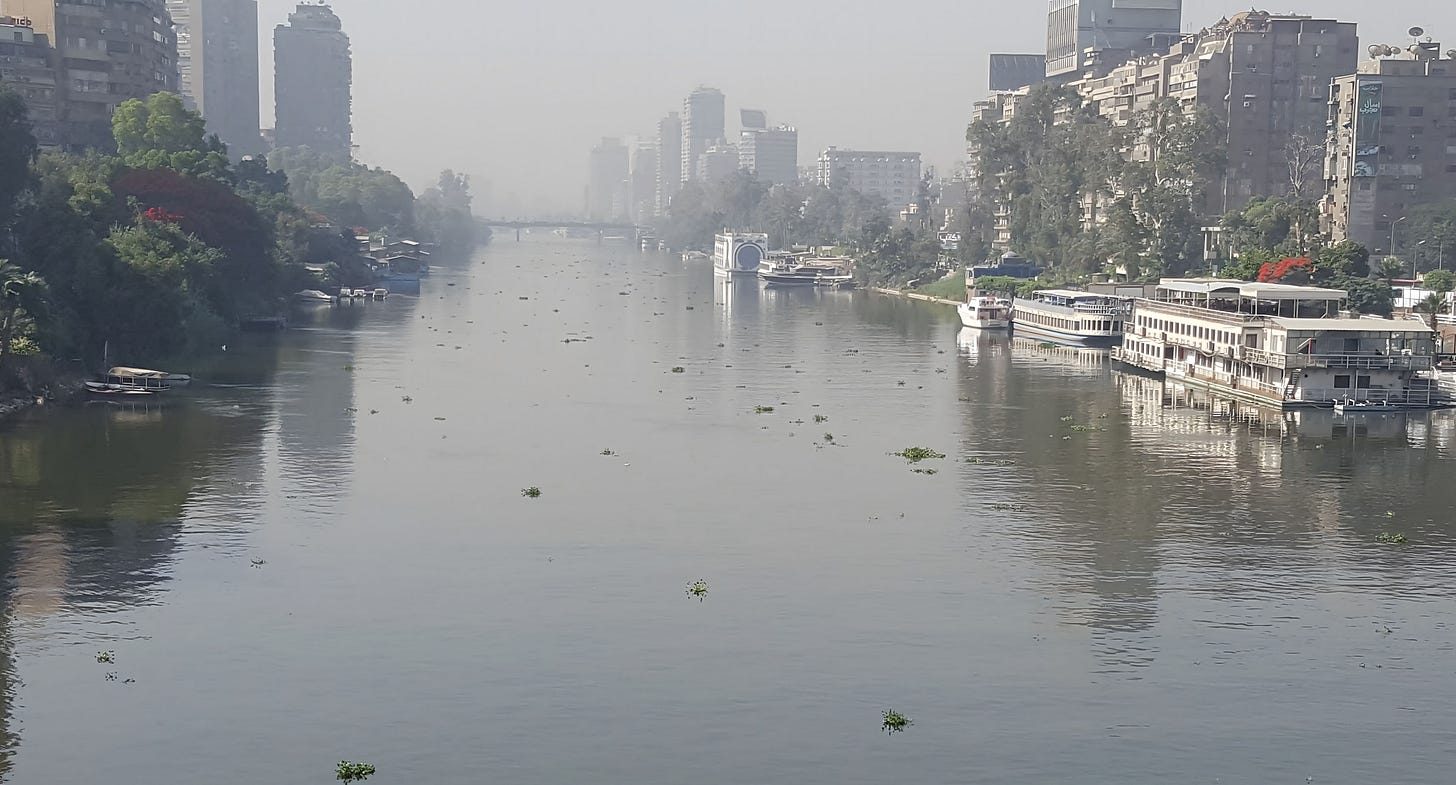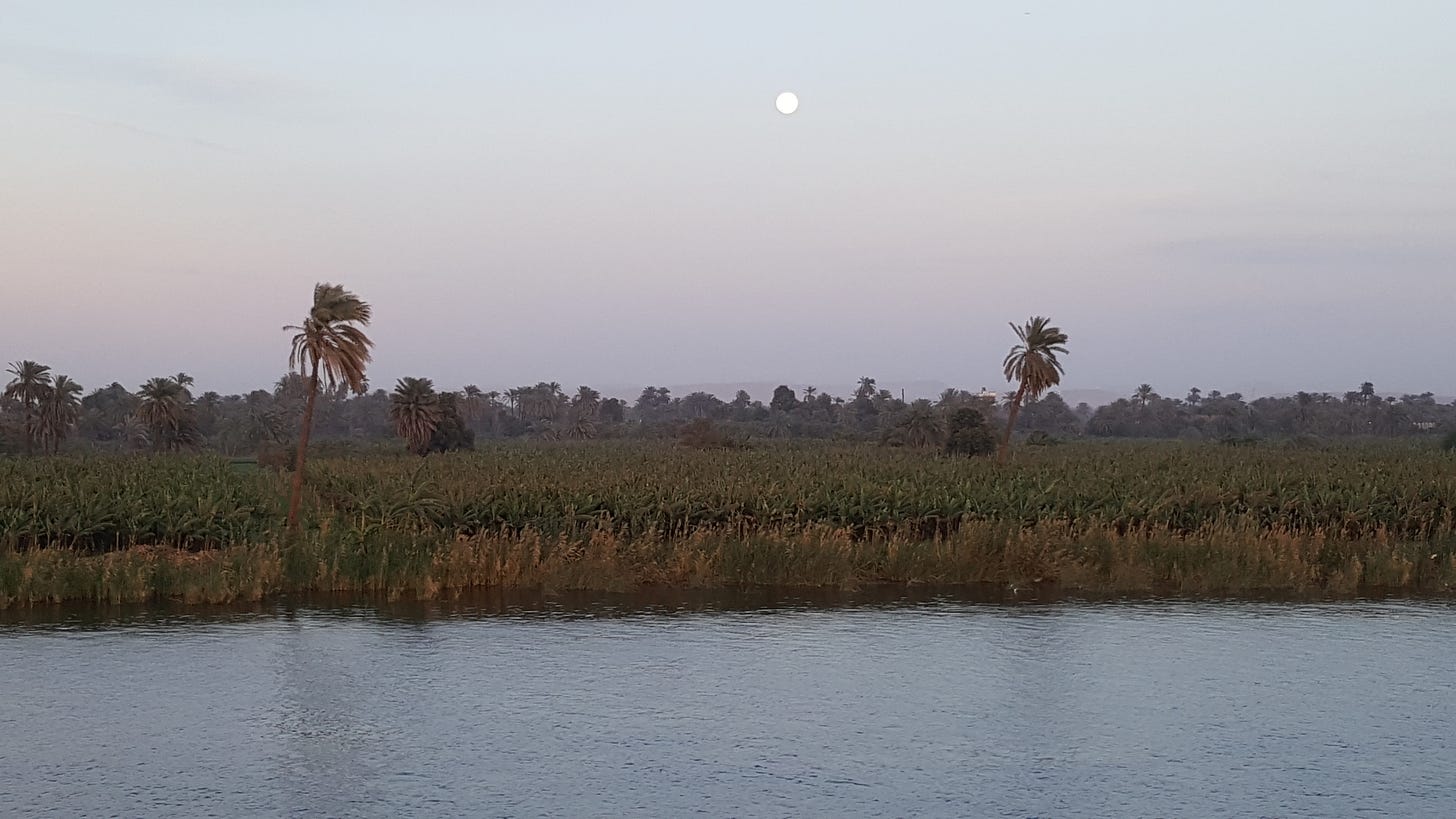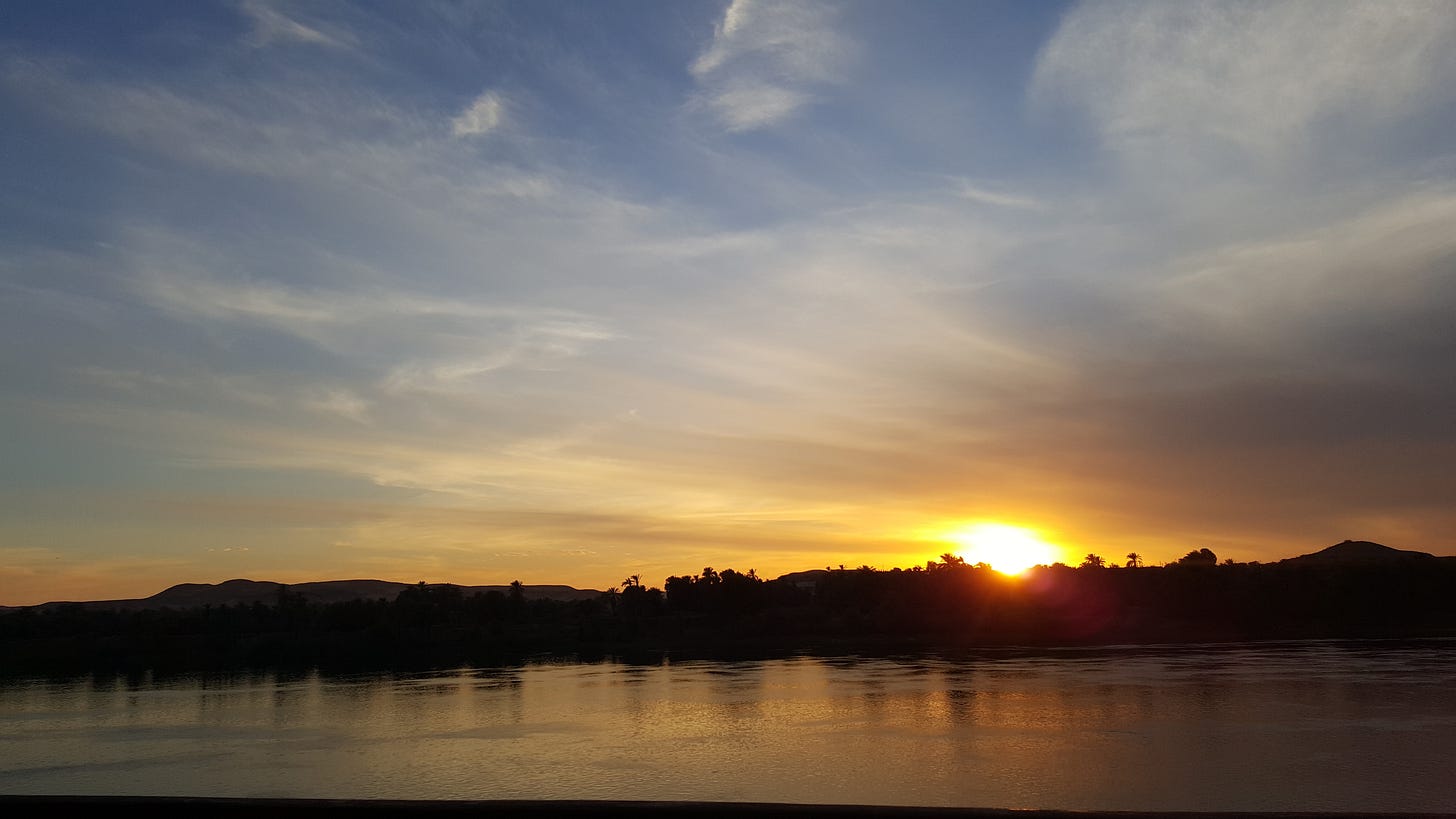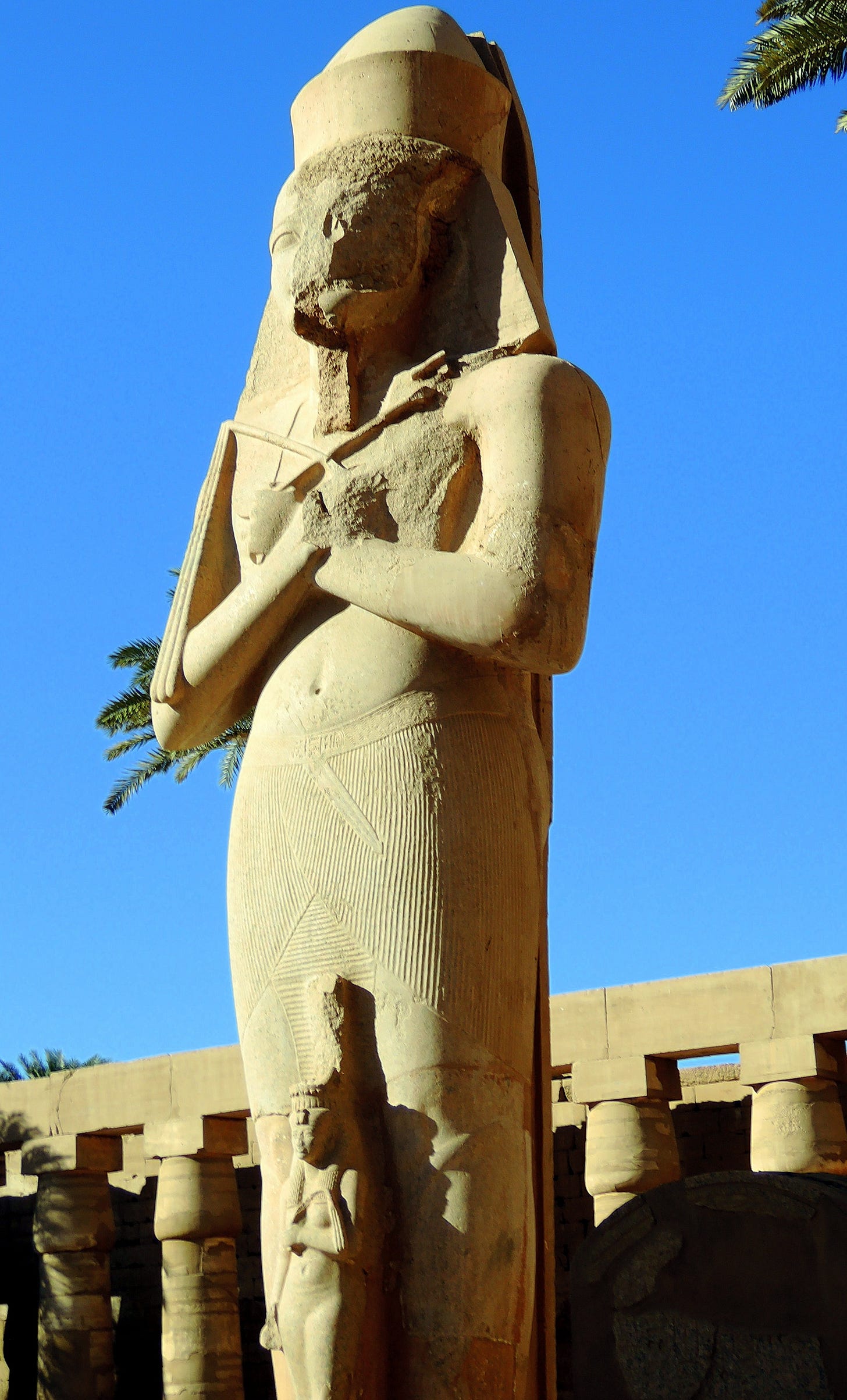As when the potent Rod
Of Amrams Son in Egypts evill day
Wav'd round the Coast, up call'd a pitchy cloud
Of Locusts, warping on the Eastern Wind,
That ore the Realm of impious Pharaoh hung
Like Night, and darken'd all the Land of Nile.
From Book 1 of Paradise Lost by John Milton
When the Nile comes over the land, the cities alone are seen rising above the water, resembling more nearly than anything else the islands in the Aegean Sea.
Herodotus, Histories.
*
As long-standing readers may recall, The Rivers of No Return1 is an occasional series of essays I started last year with one about the River Exe in Devon and then followed with one about the Thames. The series is about rivers around the world that have at some time played an important part in my life.
This one is about the Nile, which I had the good fortune to get to know when I arrived to work in Egypt almost exactly nine years ago. The longest river in the world, it has an equally long tail of cultural importance.
What follows is a brief photo essay containing a few of my impressions and experiences of this river
*
I arrived in Cairo nine years ago in September. During the heat of that month, I looked for a place to live and stayed at a hotel near the river. It wasn’t until October that I identified a place to live and then was told it wouldn’t be ready until the beginning of December. By then, I’d realised that another suitable option might not come up for months. So I agreed and stayed on at the hotel.
In many ways, it was very limiting living in a hotel, with few of my things around me, unable to cook or in any way make myself at home. But the view I had from my room of the Nile calmed me. Perhaps it even claimed me.
It wasn’t a beautiful angle to see it from, but I began to fall in love with the river during those weeks. It seemed to me that the river urged patience by example, especially at night with its dark waters rolling under the stars. Those waters had taken weeks or even months to arrive at Cairo from the river’s source. Yet it was in no hurry to reach its destination of the sea. So why should I be anxious about waiting a bit longer to unpack my bags?
*
The ultra-thin tranche of green running along the Nile in Upper Egypt (as the south of the country is known) astonished me. Beyond it, the desert stretched for hundreds of miles to the east and thousands to the west. With agriculture and cities, not to mention dynasties and an entire culture, depending throughout history on this strip of water running north through the huge expanse of desert, the sheer fragility of our world emerged to me as never before. If you see a satellite map like the one below from Google Earth, you see the tiny area of green around the river until you get to the Delta. But it’s the sight of the tiny green fringe along the river banks that really moved me.
*
The river is not a central theme in the Cairo Trilogy (1956–1957) by the Egyptian Nobel Prize winner Naguib Mahfouz (although another of his novels, from 1966, is called Adrift on the Nile). The trilogy is a vivid, fascinating and incredibly rich portrait of Cairo in the early twentieth century through the viewpoint of one family, ruled by its “tyrannical patriarch Al-Sayyid Ahmad Abd al-Jawad, who rules his household with a strict hand while living a secret life of self-indulgence.”2
Yet the river proves central to al-Sayyid Ahmad’s “secret life,” as it is carried out at night against the backdrop of the awamat or houseboats, along its banks. The strict life of piety insisted on by al-Sayyid Ahmad for his household contrasts absolutely with his visits to houseboats full of wine, music, and courtesans.
Reading the work in those early months in Cairo, I began to suspect that the Nile was not only part of the secret life of al-Sayyid Ahmad but was also moving inside all of us who lived along its banks, not as a secret life but as a kind of flowing inner life just out of the reach of the conscious mind. The Nile was beginning to be more than just a river to me.
*
To have the chance to travel by boat on the Nile in Upper Egypt and visit the wonders of Karnak at Luxor is undoubtedly one of the most wonderful experiences of my life. In my years of travel, few sights have affected me as much as the sheer resilience and continuity of life playing out along its banks.
I remember how time seemed to stand still when I first saw the sight of the moon reflected in its waters at night.
And, of course, nothing can prepare you for the sheer richness, scale, or grandeur of the archaeological sites that dot its banks.

*
The Greek historian Herodotus, whose Histories I’d read years before, visited Egypt and wrote at length of the country. He’s sometimes credited with the saying, “Those who taste the waters of the Nile will always come back,” though I don’t think it is written in the Histories. The drinking is not to be taken literally, as like most rivers in the world these days, the Nile’s too polluted for that. But I don't think the return needs to be taken literally, either.
The truth is, the river never leaves you, even after you depart. After coming under its spell, time changes forever. Years later, you can still feel its flow within, pushing you without hurry towards your future, rippling like the gentle pulse of eternity.
*
I’ll end with some words inspired by another stretch of the Nile, by Sudanese poet Al-Saddiq Al-Raddi:
The Nile knows of the disgrace of cities
That have vanished.
Knows of the old times
Yet never speaks.
It is the Nile …
Generations will pass, and there will always be children
Lingering on its banks,
Waiting
For it all to end.3
The title is, of course, a tongue-in-cheek glance at Marilyn Monroe’s 1954 film.
From Poem of the Nile by Al-Saddiq Al-Raddi (translated by Mark Ford and Hafiz Kheir).













It’s comforting to imagine water carrying both memory and promise. The last poem you shared and your own experience of the Nile living through you elevates river, ocean, even puddle, to the truth of their omniscience. I’ve always thought the expression “ashes to ashes, dust to dust” should instead end with “water to water.”
And this! Well, I read it with great pause:
“With agriculture and cities, not to mention dynasties and an entire culture, depending throughout history on this strip of water running north through the huge expanse of desert, the sheer fragility of of our world emerged to me as never before.”
The Nile is truly a beguiling river. I too was astonished by the fact the Egypt is basically a kilometre wide. It’s basically a road, a railway line and a river and a few fields, stretching for hundreds of miles. Years ago I managed to take three wonderful photographs of dawn breaking over the Valley of the Kings. The sky is a bruised pink, the river reflects it like a sheet of glass and the mountains are etched against the sky. I had them enlarged and framed and gave them to my father who had fallen in love with the Nile when he lived in Cairo as a young man. He wept when he unwrapped them. I have them now. They are doubly precious. Thank you Jeffrey.